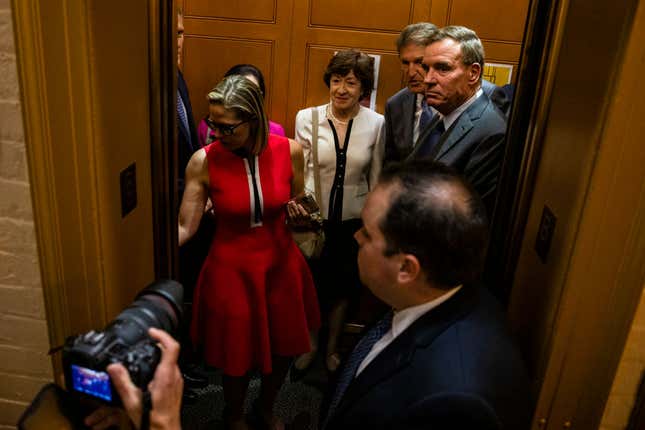
We knew it was a long shot, but an attempt to carve out a filibuster exception to pass the combination of The Freedom to Vote and John R. Lewis Voting Rights Acts failed in the Senate. With the primaries and midterm elections happening in a few months, things such as making Election Day a holiday and re-instating parts of 1965's Voting Rights Act the Supreme Court struck down doesn’t look good.
So, we are back to square one, and Congress is now looking at another way to sure up elections–although they are modest and may not do much to put a dent into anti-voting rights measures across the country. According to Business Insider, Senators are discussing a range of actions to modernize the Electoral Count Act of 1887–Sen. Amy Klobuchar and Angus King are working on one version; a group including Sen. Mitt Romney, Susan Collins, Krysten Sinema, and Joe Manchin (a shocker!) are discussing other options via Zoom.
So, what’s the ECA? Business Insider explains further:
The ECA came out of the contested presidential election of 1876 between Democrat Samuel Tilden and Republican Rutherford B. Hayes, which dissolved into a full-on crisis when several states sent multiple slates of presidential electors to Congress. A 15-member commission was tasked with deciding the true winner of the election, and the impasse only ended by Democrats agreeing to accept Hayes as president in exchange for him ending reconstruction in the South. This was a period when the US was addressing slavery and fallout from the Civil War, and Hayes’ move led to the Jim Crow era of racial segregation and oppression.
Updating this law is vital because former President Donald Trump pushed former Vice President Mike Pence not to certify the election results of 2020 and wanted alternate electors to move things in his favor. The ECA leaves the door open for something like this to happen. Sen. Mitt Romney spoke about negotiations starting with NBC News:
“Some items relate to making sure that election officials are not harassed. Others relate to how elections are certified. Others relate to what the role of the vice president is in the electoral counting process and how you would deal with an objection to a slate of electors,” he said. “There are long lists from each of us, and we are just now beginning to talk about which of these we’ll find sufficient support to include in a bill.”
Items such as more funding for elections and federal protections against harassment and intimidation of election workers are being discussed. Then again, it’s the Senate, and these measures would need 60 votes to pass. I didn’t think we would see the day, but we have finally found Sens. Manchin and Sinema’s starting point.
Senate Majority Leader Chuck Schumer, D-N.Y., said it “makes no sense” to ditch the voting bills for a change to the Electoral Count Act, saying the more modest changes wouldn’t take away Republicans’ ability to “rig the game.” I agree with him. While we need to do a better job to help election workers, we can include that in the bigger voting rights bill.

